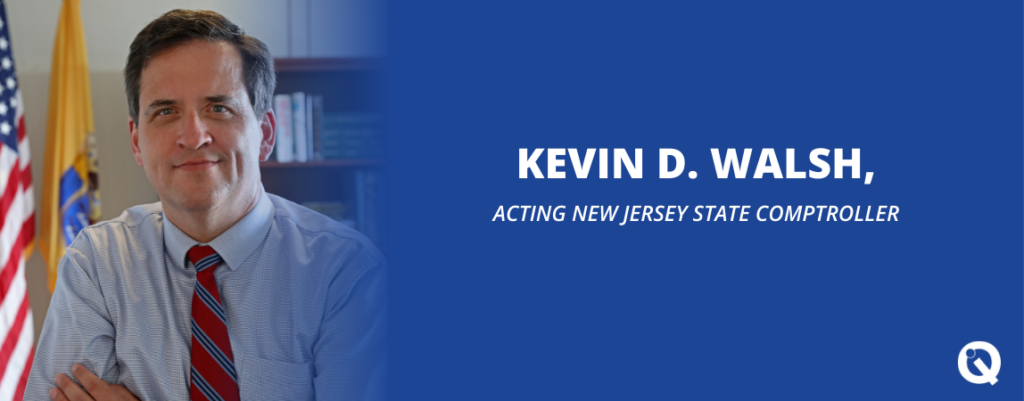Kevin D. Walsh, Acting New Jersey State Comptroller.
The Office of the State Comptroller investigates misconduct by government employees and officials and advances accountability and transparency across government on behalf of taxpayers. (In full disclosure, the spouse of Linda Schwimmer, President and CEO of the Quality Institute, works within the Comptroller’s Office as Director of the Division of Medicaid Fraud.)
Can you explain to our readers how your office impacts health care quality, safety, and affordability?
The office is an independent watchdog agency that looks out for fraud, waste, and abuse across government. With respect to New Jersey’s Medicaid program, we have recovered almost $1 billion in improperly spent Medicaid funds over the past decade.
In addition to saving the State money, our work also impacts care. When Medicaid money is siphoned away from patient care and into providers’ pockets, there is a direct impact on the care Medicaid recipients receive.
For instance, in nursing homes, if the money that would have paid for nurses instead goes into the pocket of the owners of a related entity, care is harmed. Or, in the pharmacy context, pharmacists who claim to have dispensed medicine that wasn’t dispensed — patient care is affected. We also see providers of durable medical equipment that claim to provide equipment that the Medicaid beneficiary never receives. When care has been paid for but not provided, it almost certainly leads to worse health outcomes.
What are fundamental steps that mayors and other local officials can take to reduce waste or fraud?
Our audits have identified a few different areas where mayors and local officials can reduce waste and achieve cost savings related to health insurance.
Here’s one example: When buying health benefits insurance for their employees, local officials should consider all the associated costs and determine which plan is best for the employees and the taxpayers. When municipalities participate in the State Health Benefit Program (SHBP), the brokers do not get paid commissions. We have identified case after case in which insurance brokers have provided incomplete and inaccurate information to towns, steering the local government away from the option in which the broker would not be paid a commission.
Another example: Sometimes municipalities provide insurance to employees who aren’t eligible. The State Health Benefit Program requires employees to work full-time. In another audit, we found a municipality paying for two insurance policies for its retirees when they obviously only needed one.
There’s a lot of money at stake when it comes to health insurance for public employees. There should be special vigilance to controlling these costs, given how much money is at stake. What we have found in many instances is that towns aren’t always considering what’s the best deal for taxpayers as well as what’s good for employees.
What changes would you like to see to address the safety and quality issues you identified in your reports on nursing homes?
What we’ve found is that poor quality care in some nursing homes appears to be a way of doing business. We’ve found multiple nursing homes that have had the lowest possible CMS star ratings for long periods of time and yet they still get paid the same amount of money. That is what we’ve pointed out in three different reports we’ve issued, and almost all of the recommendations we have made have yet to be implemented. There should be a direct connection between the ability to participate in Medicaid and the ability to provide quality care. Sometimes a nursing home may temporarily find itself in the position of being a one- or two-star facility. But when poor quality of care is a way of doing business, the State of New Jersey — both from the standpoint of caring about residents, but also from the standpoint of making sure our dollars are spent wisely — should reject that.
And when we see poor quality care, the presumption by State agencies is that it’s because the owners don’t know better; it’s because they need a little bit of help. Sometimes that may be the case. But we also equally must consider they are raking in outsized profits at the expense of their residents by taking money that’s supposed to go to nursing care.
The Quality Institute has more than a hundred organizational members in all areas of health care. If they see something that appears like a misuse of government funds, something that’s just not right, what should they do?
If you see fraud, waste, or abuse in Medicaid or in your own town, we want to know. We have hotlines and encourage people to share tips. We also want to hear from people who believe officials in their town are spending money that they shouldn’t be spending or spending it without the protections that the law requires. And we keep tips confidential. I’m especially interested in hearing from employees of poor performing nursing homes who know how the scams work.
Finally, we like to ask a question beyond a person’s professional work. If you could choose anyone (throughout history or alive today), who would be your hero?
I have two heroes in my life and they’re my parents. They both emigrated from small farms in Ireland with modest beginnings and came to this country in pursuit of the American dream. They met at a dance in Philadelphia, started a family and a created a family landscaping business that I worked at as a teenager. They taught me and my siblings the importance of treating people with dignity and respect. Their example informed who I am as a person — and led me to me feel strongly that I need to have a nice front lawn! They also succeeded at raising me and my siblings, giving us good lives, and making the world a better place. And so they’re my heroes.

